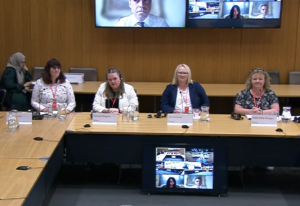According to a recent report by the Senedd’s Children, Young People and Education Committee, many disabled children and young people in Wales are being “fundamentally let down” because they are not getting the education they have a right to.
The committee, made up of Members of the Senedd from several political parties, has been investigating how education in Wales is delivered to disabled children and young people. You can read the committee’s full report here.
The committee found that the denial of this basic right to an education that all children and young people are entitled to have, is impacting on their emotional and mental well-being, their opportunities in life and their educational attainment.
After gathering evidence from around Wales, the committee also made a series of recommendations for the Welsh Government to implement so that education chances are fairer, and disabled children and young people have the same access to the education system as anyone else.
What did the report say?
The committee made 5 conclusions in its report:
- A significant number of children and young people’s rights to an education as set out in Articles 28 and 29 of UN Convention on the Rights of the Child are currently being breached in Wales. These children and young people are being fundamentally let down.
- Denying children and young people their right to an education can have lifelong and far-reaching impacts on their emotional and mental well-being, as well as their physical health. It can impact on their educational attainment and opportunities, thereby creating barriers to them being able to make choices that best suit their ambitions as they become adults.
- The impact of denying children and young people their rights can be immeasurable on their family, particularly on parents, carers and siblings. Families often have to fight for basic rights, which the families of non-disabled and/or neurotypical children and young people rightly take for granted.
- While there is some inclusive provision that meets the needs of children, young people and their families, this provision is patchy and inconsistent across Wales. There are additional challenges faced by those accessing Welsh medium provision.
- The barriers to delivery of inclusive childcare and education are complex and interlinked. Some of them are very broad and relate to societal approaches to disability and difference while others are quite practical.
These conclusions were underpinned by a list of recommendations to make education truly inclusive and accessible for disabled children and young people, with important implications for the Welsh Government.
What impact could the report have?
As an organisation, Learning Disability Wales wants to see an end to segregation in the education system. Special schools play a vital role in the learning for so many disabled children and young people and we understand the nervousness of many parents in sending their children into so-called mainstream schools. At present, resources in many of those schools are not adequate.
But if we establish a truly inclusive education system that is properly funded and has the right resources, then we can build a truly inclusive Wales where everyone has the opportunity to live a good, independent and happy life and where barriers to that potential are removed.
This report endorses this view and makes plain the challenges that exist for Welsh Government, for schools and teachers and, most importantly, for learners themselves in making that happen. Radical change is needed but an inclusive future can only be brought about with such change.
The real challenge now is for the Welsh Government, for Ministers and their civil servants, to take notice of these recommendations, to listen and to make that change happen. It will not be good enough for this report to be put on a shelf to collect dust, it is something that should be absorbed by policymakers, to challenge their thinking with the outcome being a changed and inclusive education system.
What does Learning Disability Wales say?
 Our Chief Executive, Zoe Richards is backing this report and gave evidence to the committee alongside Welsh Youth Parliament Member Georgia Miggins and parent Adele Rose-Morgan as part of the inquiry into the state of education for disabled children and young people. You can watch the evidence session here.
Our Chief Executive, Zoe Richards is backing this report and gave evidence to the committee alongside Welsh Youth Parliament Member Georgia Miggins and parent Adele Rose-Morgan as part of the inquiry into the state of education for disabled children and young people. You can watch the evidence session here.
Zoe is calling for Wales to establish a truly inclusive education system, giving children quality support as they grow and move through schools.
Zoe said: “This report has the potential to begin the change in Wales we need to see, with a positive and impactful effect on education policy here.
“That means improvements for disabled children and young people. Our system of learning should work for everyone, no matter who they are. At present it does not. It is segregated, it is resourced in a patchwork fashion with a postcode lottery of provision. Put simply, this is not good enough.
“It means some parents of disabled children often do not have confidence the system will work for their loved ones, it means children do not have equity in the provision of their learning, and more broadly it means we as a society are not living up to our duties in creating communities that are cohesive and nurturing, providing opportunities to thrive no matter who you are, whether you are disabled or not.
“An inclusive education is not just something we think is right for disabled children, we think it is right for everybody. We have an opportunity in Wales to make that happen, we can work together to do that. But it will first take a great deal of political will and leadership to begin that change.”



 >
>
 >
>
